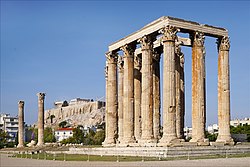Greco-Roman world

The Greco-Roman world is a term used to describe the ancient societies that were influenced by the Greek and Roman cultures. Back in the olden days when there was no internet, people of different regions had specific ways of living, and everything they do was different from others. However, the Greeks and the Romans were among the most successful and famous civilizations who lived more than two thousand years ago. They had a significant impact on everything from languages, arts, religion, and politics.
Imagine that different people live in your neighborhood. Each person speaks a different language and wears unique clothes. This is how the world was before the Greeks and Romans came. The Greeks were talented with writing beautiful stories and making beautiful art pieces. The Romans, on the other hand, were great at building roads, aqueducts, and buildings. They were also known for being powerful warriors who conquered many lands.
The Greco-Roman world was mostly located in what is now known as Europe and the surrounding Mediterranean countries. Ancient Greece was situated in the eastern parts of Europe, while Rome was in Italy. People in these areas spoke different languages, worshipped different gods, and had different governments before the Greeks and Romans came. However, as time went on, they started adopting some of the Greek and Roman customs into their own culture.
The Greeks established the first democratic government in Athens, which means everyone had a say in important issues affecting their city. The Romans were known for having great leaders called "Emperors." They ruled over vast territories, including North Africa, parts of the Middle East, and Europe. They also introduced Latin, which is the basis for most Western languages like English.
All in All, the Greco-Roman world is an exciting era full of history lessons. It is a term used to describe the time when Greek and Roman cultures had a significant influence on the societies in Europe and around the Mediterranean countries. From language to arts, religion, and politics, these two civilizations left a remarkable legacy that still affects us today.
Imagine that different people live in your neighborhood. Each person speaks a different language and wears unique clothes. This is how the world was before the Greeks and Romans came. The Greeks were talented with writing beautiful stories and making beautiful art pieces. The Romans, on the other hand, were great at building roads, aqueducts, and buildings. They were also known for being powerful warriors who conquered many lands.
The Greco-Roman world was mostly located in what is now known as Europe and the surrounding Mediterranean countries. Ancient Greece was situated in the eastern parts of Europe, while Rome was in Italy. People in these areas spoke different languages, worshipped different gods, and had different governments before the Greeks and Romans came. However, as time went on, they started adopting some of the Greek and Roman customs into their own culture.
The Greeks established the first democratic government in Athens, which means everyone had a say in important issues affecting their city. The Romans were known for having great leaders called "Emperors." They ruled over vast territories, including North Africa, parts of the Middle East, and Europe. They also introduced Latin, which is the basis for most Western languages like English.
All in All, the Greco-Roman world is an exciting era full of history lessons. It is a term used to describe the time when Greek and Roman cultures had a significant influence on the societies in Europe and around the Mediterranean countries. From language to arts, religion, and politics, these two civilizations left a remarkable legacy that still affects us today.
Related topics others have asked about:
